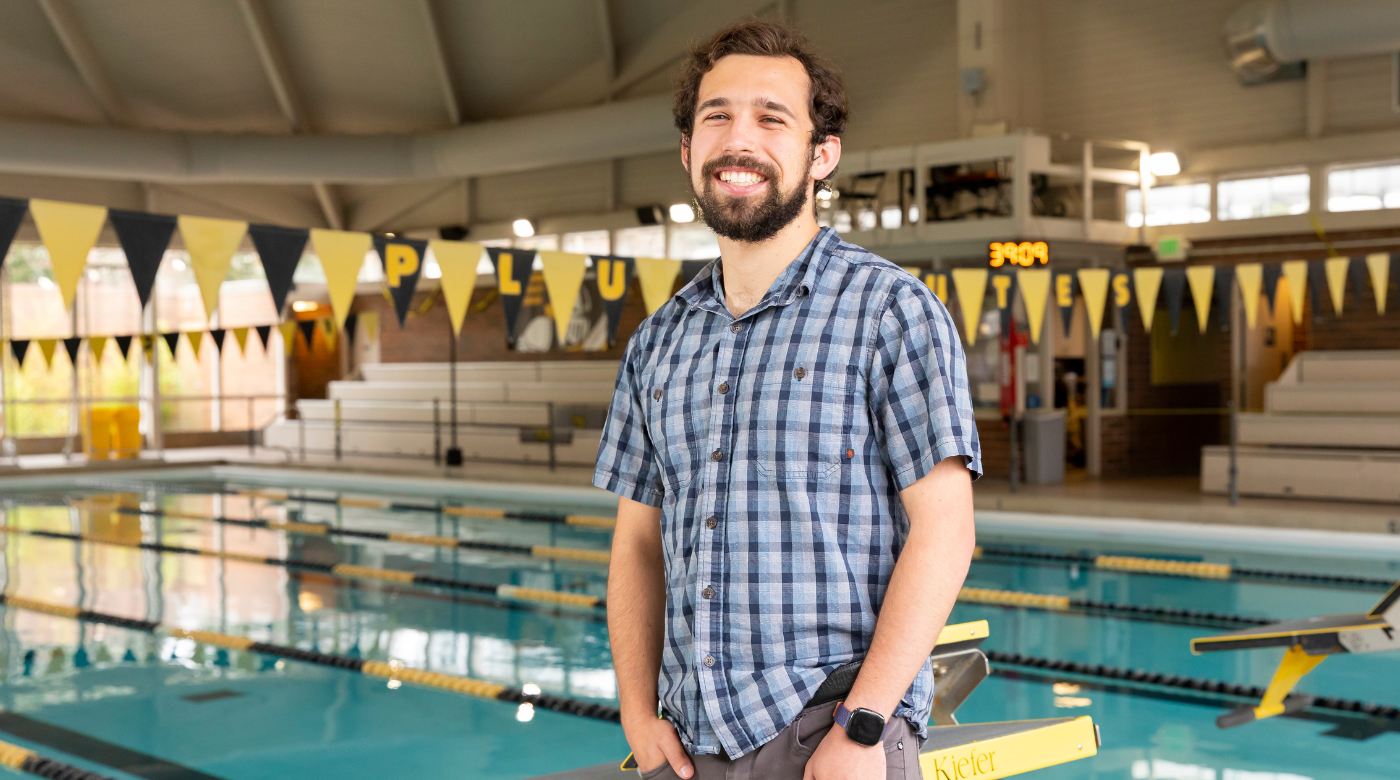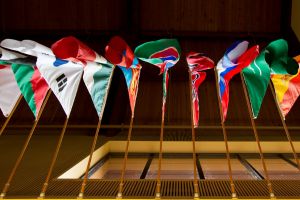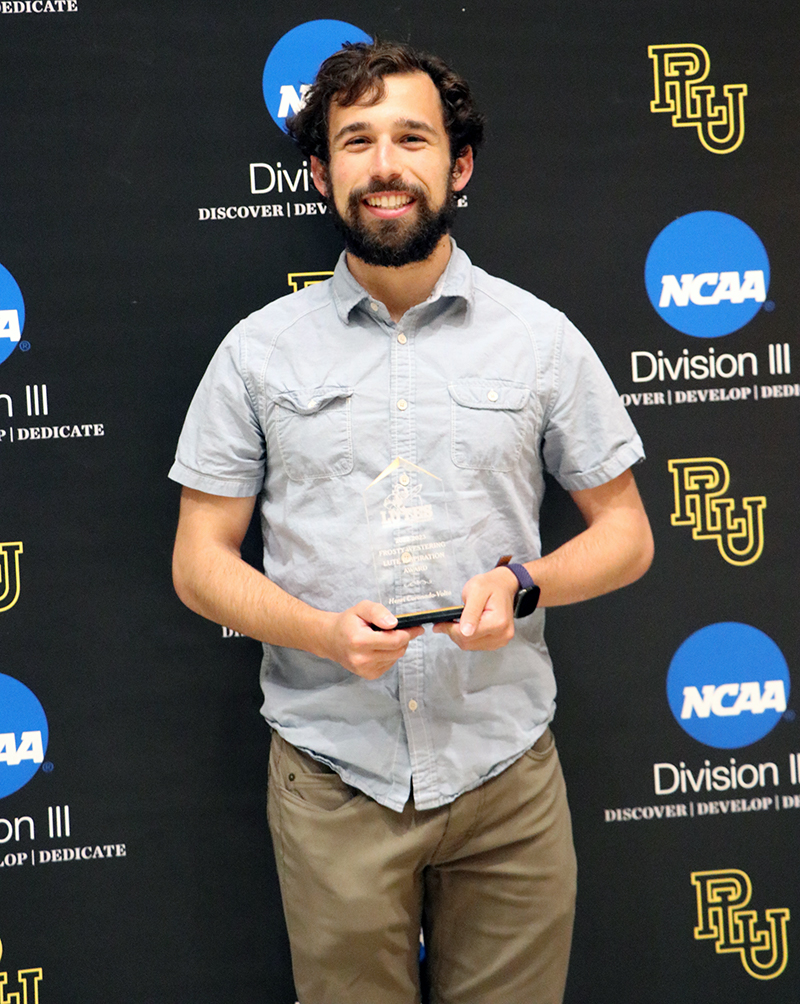Henri Coronado-Volta ’23 discusses his global studies major, studying away, and his plans to attend UW’s Public Health Epidemiology program

Image: Henri Coronado-Volta ’23 (PLU Photo / Sy Bean)
By Lora Shinn
PLU Marketing & Communications Guest Writer
Henri Coronado-Volta grew up in Seattle, Washington, and chose PLU because the smaller school offered the opportunity to build community, a chance to continue swimming, and living close to home—but not too close. He double majored in global studies and Hispanic studies and minored in Holocaust and genocide studies. We recently met with the PLU senior to discuss his plans for improving health for all.
What did you enjoy or learn from your Global Studies major?
I enjoyed learning about the strengths and challenges experienced by countries worldwide. In my classes, we studied countries through the use of case studies. It’s important to me to learn what’s happening beyond the United States and how events in these other countries impact our daily lives.
I particularly enjoyed the Global Studies final projects because my classmates and I each chose a country and problem, then figured out how to solve it effectively. My case studies focused on Bangladesh, Mali, Uruguay and Bhutan. One that stood out was a project on how China, India and South Africa dealt with the pandemic during the lockdown and its effects on the greater world economy.
How did your PLU academic studies compliment your post-graduation plans?
I’ll get a Master of Public Health in Epidemiology. I am specifically interested in global public health and plan to focus on the Hispanic population. Gaining a broader understanding of world events was important.
Hispanic studies is my second major, as I hope to focus on the Hispanic community, in public health. My grandfather came here from Mexico as a migrant farmworker with my great-grandmother and his brothers and sisters. He never had the opportunity to get past a third-grade education or health insurance until he aged into Medicare.
I understand you have experience as a swimming student-athlete. How did you balance sports and school?
At first, it was very challenging. I struggled with time management, balancing school work, swimming and socialization. Unfortunately, the pandemic hit during the spring quarter of my freshman year of college. I rushed home. I took this time to reevaluate and focus on my studies and worked on my time-management skills.
When the pandemic was less of a concern, I reacquainted myself with my busy life more successfully. It was really important to start school with the swim team’s built-in friend group, and worth the learned skill of managing sports and school work.
What do you think sets PLU apart from other universities?
The professors who are invested in your learning and those professors’ willingness to help you understand the material set PLU apart. The smaller community, class sizes and opportunity to know so many students make it feel like family.
What have you enjoyed most about your PLU experience?
The community I built at PLU. I’ve been fortunate to meet many great friends through swimming, classes and two study-away programs.
I wasn’t sure if I would go to Oaxaca (J-Term 2022) because we were coming out of the pandemic. There was a lot of uncertainty. My host family tested positive for COVID within two days of my arrival, and I had to move. We were constantly testing.
It was a great trip, as I could walk around the city with my friends and take weekend trips to places like Monte Alban, Mitla, Yagul, Santa Maria del Tule, Ixtlán de Juárez and Tlacalula de Matamoros. There is nothing like immersing yourself in the culture, the food and the language.
In Montevideo (J-Term 2023), I lived with the nicest host family ever, explored the city with my friends and enjoyed everyday life. Weekend trips took us to Punta del Este, Colonia del Sacramento, Salto de Penitente and Rocha. I tried maté, a highly caffeinated drink that people drink any time of the day (or night). I’m still in contact with some friends in Uruguay, which is pretty special.
You will attend the University of Washington’s Public Health (MPH) Epidemiology program this fall. How do you feel PLU prepared you for graduate school?
By broadening my perspective on the world in my study away and individual country class research. PLU helped instill useful study habits and time management skills, and provided opportunities to improve my Spanish through classes and study away programs.
Networking opens up many opportunities. While at Seattle Children’s, I was responsible for reaching out to find traumatic brain injury resources in Alaska for a study at Children’s. In the fall of 2022, I did preliminary literature review research and interview-question Spanish translation for a University of Washington palliative care and dementia issues project. As part of that project, I’m helping translate resources for brain injury recovery.
I also interviewed Seattle and King County leaders about supplying pandemic safety resources. It was a great segue into my capstone focused on how the pandemic affected gig workers, due to a lack of policies and benefits provided to Hispanic populations.
What’s after you get your master’s degree?
Obtaining a Ph.D. in Global Health. In a perfect world, I envision working in different countries doing surveillance epidemiology or figuring out the most pressing issues in that country related to healthcare and working with communities to find solutions to public health issues.
Is there any advice you’d give a student starting at PLU?
Time management will take you far—as you are busy—and you need to prioritize important things. Initially, I was afraid to use resources, such as connecting with my professors and asking for help on things I didn’t understand the first time around.
Be open to developing new friendships and community; don’t be afraid to put yourself out there. This is a period to try new things and not limit your options. Explore the different paths available to you.




